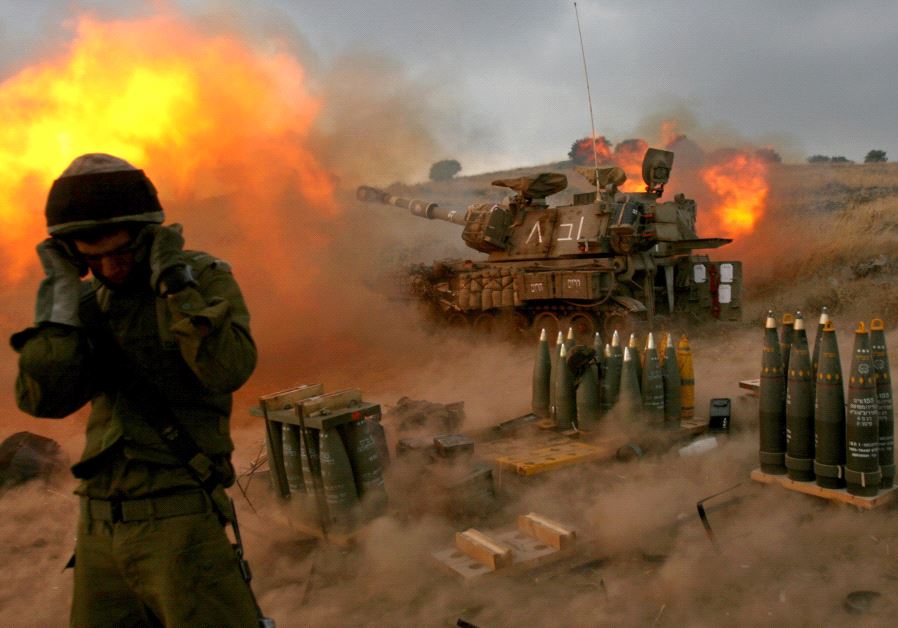جيرازلم بوست: الحرب المقبلة ستكون دموية/جولة على الحدود الإسرائيلية اللبنانية
‘The next war will be bloody’: A trip along Israel’s tense northern border
Anna Ahronheim, Seth J. Frantzman/Jerusalem Post/June 28/017
“The next war will be pretty bloody for both sides. Israel will evacuate its population and I suggest the Lebanese do the same,” Lt.-Col. (res.) Sarit Zehavi told The Jerusalem Post at a briefing in Metulla, Israel’s northernmost town at the border with Lebanon. Zehavi heads Alma, a local organization that briefs visitors about the security situation – which has grown a bit tense of late. In the event of war with Hezbollah, Metulla is expected to be one of the communities evacuated.
But despite the ever-present risk of conflict with the Lebanese Shi’ite group, the community of 2,000 people continues to grow. As Zehavi spoke on Tuesday, Lebanese workers could be spotted in the distance, and tractors rolled down the streets of Metulla. It was a business-as-usual scene that belied the threats overshadowing the border region.
Israel has long avoided evacuating civilians during wars, but is looking to change that policy in the North. In addition to the threat posed by Hezbollah’s stockpile of more than 100,000 rockets, the IDF is now concerned about the very real possibility of ground attacks against Israeli communities. “Hezbollah knows how to fight and how to move large forces,” Zehavi said, stressing that the group would likely not try to seize any Israeli villages.
But many are worried that Hezbollah “may try to strike fear throughout the country by massacring civilians.” “It will be a totally new battlefield than what we saw in 2006,” she said, pointing out that the group has significantly increased its battlefield knowledge by fighting for the regime of Bashar Assad. “Everything they learn in Syria, including from the Russians, they will put into use here.”
Israel and Hezbollah fought a 34-day war in 2006. Since then, hostilities between the sides have been limited to occasional firing from across the border and reported Israeli air strikes against Hezbollah leaders and military equipment in Syria. “While Israel has the dilemma of responding and deterring Hezbollah while not escalating the conflict, it’s all about deterrence and about making them understand that the cost of conflict will be very high,” Zehavi said. She discussed two scenarios that would lead to war on the Lebanese front.
“One would be Iran deciding to give the order to attack Israel, and the other would be a miscalculation by either side which would escalate into a full-blown war,” she asserted as she pointed out a large poster put up by Hezbollah on a hill overlooking houses being constructed in Metulla. Next to the poster, which Zehavi said was put up last week to commemorate al-Quds Day, fly two Hezbollah flags and a large Palestinian one. A Hezbollah poster features a photo of the Dome of the Rock and an armed fighter. The face of Ayatollah Ruhollah Khomeini glowers down over the dome where “We are coming” is written in Hebrew and Arabic.
Hezbollah, which is supported by the majority of the Shi’ite population in Lebanon, has not only inserted itself into every aspect of civil life, but is using civilian homes to store its weapons, an arsenal rebuilt and improved with the help of Iran. The area near the Lebanese border has been flagged by the IDF as vulnerable to enemy infiltration and has seen two such incursions into Israel since 2009, Zehavi said. While the army hasn’t found any tunnels in the North, the terrain allows fighters to hide ahead of an attack, she said, adding, “Hezbollah knows how to dig.”The border fence was originally built in the 1980s. While sections have been upgraded several times with engineered barriers – including reinforced concrete panels several meters high and concrete walls and fortified watchtowers – it is considered by some to be in poor condition.
This has led Israel to invest significant amounts of money and effort into strengthening defenses along the border over the past several years, creating obstacles such as artificial cliffs and building high concrete barriers to help prevent ground attacks by Hezbollah. A six-meter tall steel and barbed wire “smart fence” stretching several kilometers with information collection centers and warning systems is to be built along two stretches of the Lebanese border. According to Zehavi, one can already see the fence being built between Rosh Hanikra and Kibbutz Hanita, northeast of Nahariya.
But it is not only along those stretches that one can find construction aimed at protecting civilians. Fortified shelters that include bus stops have recently been constructed. Additional recently built barriers can be seen when driving toward the Syrian border on a short detour toward the town of Ghajar, which straddles the Israel-Lebanon border. These barriers are intended to shield civilians from the kind of fighting that broke out on June 25, when five rebel groups attacked Syrian regime positions near Quneitra within view of the Golan Heights. After two days of fighting, in which numerous projectiles hit on Israel’s side of the border and Israel responded by targeting Syrian regime military positions, the rebel attack was beaten back and quiet returned to the border area.
He recalled after the Syrian rebellion broke out in 2011 that rebels began to use the demilitarized zone along the border to move between Sunni Arab villages that formed the heart of the rebellion.
Regime forces used their artillery to strike at the rebels.
“I’m more concerned by Hezbollah and the Syrian regime.
Not as afraid of the rebels,” he said.
*According to foreign reports, Israel has formed a working relationship over the years with the Syrian rebel groups across the border. This keeps Hezbollah and Iran away from the border for now, but local residents and farmers wonder when the rebels will be defeated and new flags will greet them in the morning, like the Hezbollah ones that fly in Lebanon opposite Metulla.
Effie Eitam, a former Knesset member and retired brigadier- general who lives on the Golan, said the goal must be to make our enemies understand that “Israel will not tolerate any attacks and has made it clear that it doesn’t matter if it is deliberate or as spillover from the Syrian war.”
**Eitam said that means: maintaining clear redlines: no Iranian presence; freedom for the Israel Air Force to operate; not letting anti-aircraft systems near the border; and ensuring that any final resolution of the conflict in Syria leads to stability on the border.
http://www.jpost.com/Arab-Israeli-Conflict/The-next-war-will-be-bloody-A-trip-along-Israels-tense-northern-border-498169



















